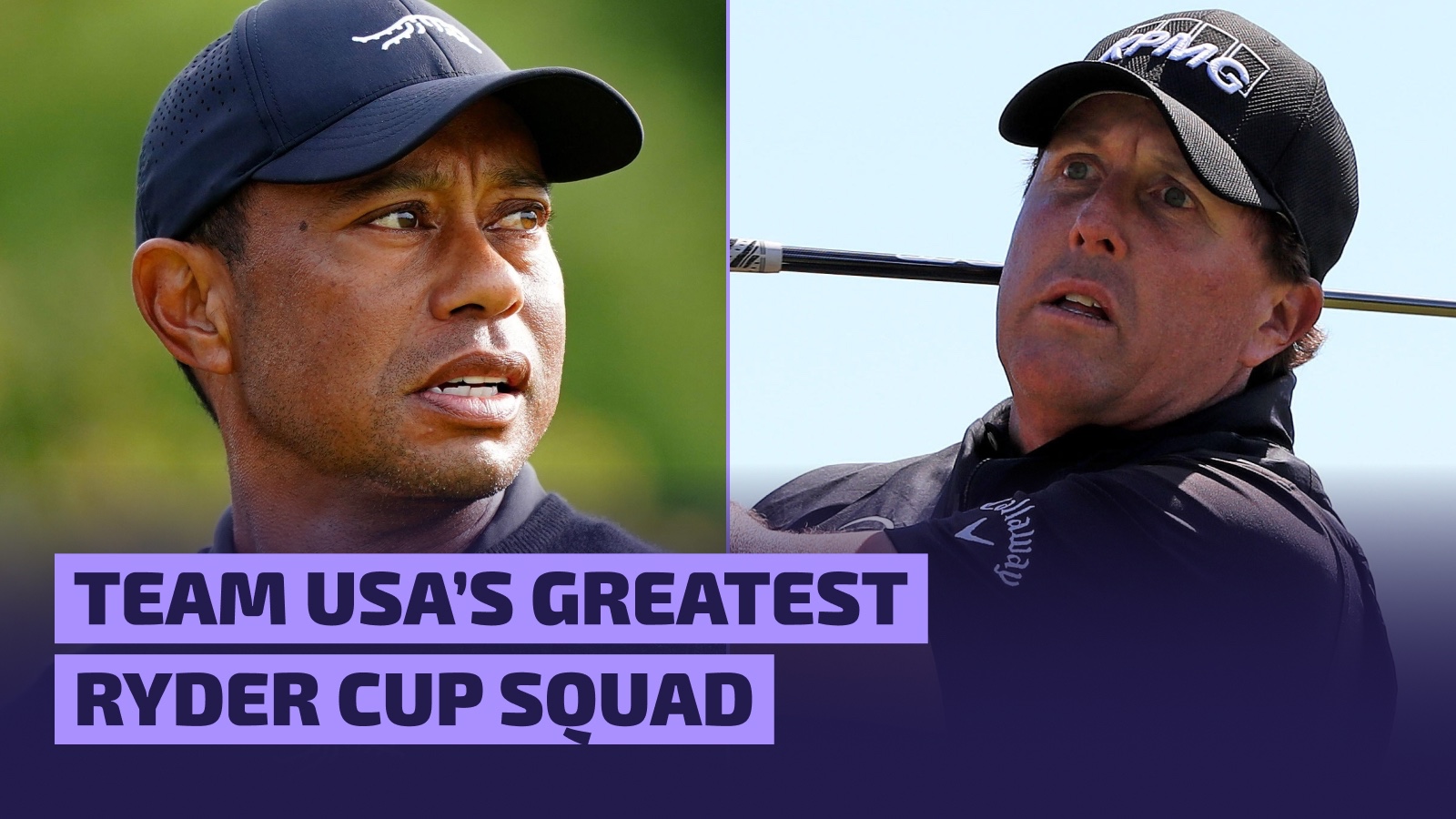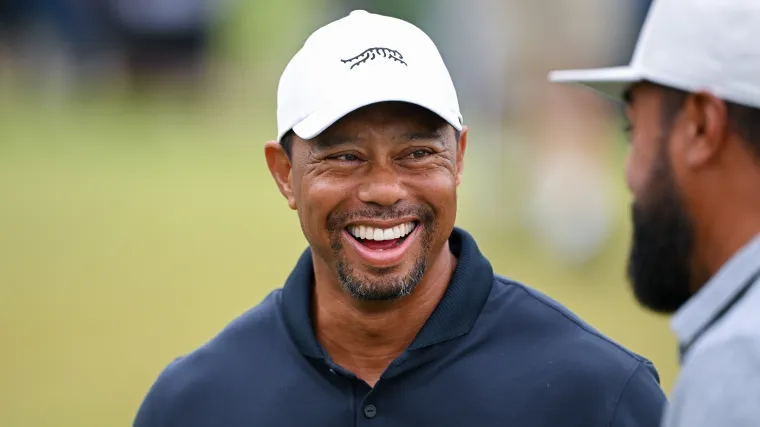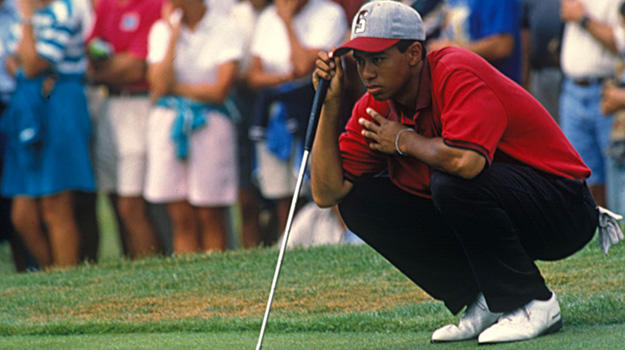What would Team USA’s greatest-ever squad look like with everyone in their prime?
As Keegan Bradley has discovered this year, assembling 12 good men and true to win a Ryder Cup is no easy task.
But what if he had 98 years of Ryder Cup golf to pick from? What if we gave him the opportunity to pick from every American golfer since 1927 when they were at their best?
It’s an enticing prospect but one that is also quite tricky because there are an abundance of riches.
Selection needs care. We need good records, but also to look beyond the stats.
We need 12 golfers in their prime and no flukes. For example, Billy Maxwell played four matches in 1963, his only Ryder Cup, and won all of them, but he doesn’t get in.
We are also – very specifically – looking for Team USA’s 12 greatest performers in the Ryder Cup.
That rules out the two greatest players of the modern era: no Tiger Woods and no Phil Mickelson.
Woods played in eight Ryder Cups, played in 37 matches and won just 14.5 points at a remarkably poor return of 39.19%. In 29 foursomes and fourball matches he landed just 9.5 points!
Mickelson was little better in his 12 appearances, winning just 21.5 points in 47 matches (45.74%).
The pair were among the greatest-ever as individuals, but only journeymen in a team.
Who does make the grade? Let’s see.
Ben Hogan
The great Hogan played just two matches, but there are good reasons to include him. Principally because he was involved in a life-threatening car accident between his two appearances.
On debut in 1947, as a playing captain, the nine-time major winner played just one foursomes match and won it. Four years later, post accident and having won the only two majors he entered that year, he won both his foursomes and singles.
As tough as teak he was never beaten, never halved, and – in honour of Bradley – we’ll make him playing captain.
Arnold Palmer
The King played six times between 1963 and 1971 winning 23 points in his 32 matches. Moreover, 16 of those points came in 21 foursomes and fourballs so he could do what Woods and Mickelson could not: excel alongside a team-mate.
The seven-time major winner was never better than in the 1967 when he played in five of the six sessions and won every single match in a brutal 23.5-8.5 destruction of the visiting team at the Champions Club in Houston, Texas.
Jack Nicklaus
If Woods and Mickelson were the stars of the modern era, Hogan, Palmer and Nicklaus preceded them and the entire trio plays on this team.
Nicklaus played in six matches but it would have been more because arcane rules left him ineligible until 1969 (when he had already won seven majors).
On that debut, the 18-time major winner famously conceded a putt that resulted in the Cup first tie, but he was no softie. In all he won 18.5 points in 28 games and he would not be left out of the fourballs because he won eight of nine he played in.
He was at his best in 1971 when winning five points from six matches.
Walter Hagen
The superstar of the pre-war era, The Haig won 11 majors and the US Ryder Cup team was built around him. He only played nine matches in his five appearances, but he won 7.5 points in them and was undefeated in foursomes.
Take a bow Scotsman George Duncan – the only man to beat Hagen in the first five Ryder Cups ever played.
Billy Casper
Buffalo Bill was a three-time major winner and eight-time representative of Team USA. He won 23.5 points in his 37 matches which marks him out as the all-time top points winner for the Americans.
He was dominant in his first two appearances winning all three matches on debut in 1961 and 4.5 points from five matches in 1963. Undefeated in that stretch, he’s in.
Sam Snead
Slammin’ Sam was a winning machine, landing seven majors and 82 PGA Tour titles (still tied first of all-time). He was also a seven-time Ryder Cupper between 1937 and 1959 who won 10.5 points in his 13 matches.
He was never better than in 1951 when winning his foursomes 5-and-4 and then dumping the Open champion Max Faulkner 4-and-3.
Lee Trevino
Supermex was the winner of 20 points in 30 matches across six starts. The six-time major winner was at his wise-cracking, gnarly best in 1973 at Muirfield when he lost just one of his six matches.
Crucially, however, it was his 1.5 points on day one that kept the US from dire trouble before they overwhelmed the hosts.
Lanny Wadkins
If Trevino was one streetfighter, Wadkins was another. “Guys like me and Hale Irwin,” he once said. “We were mean. We were junkyard dogs.” The one-time major winner won 21.5 points from 34 matches in eight starts.
He liked the Ryder Cup from the get-go, winning all three matches on debut in 1977 and claiming four points from five in 1979.
Hale Irwin
Wadkins liked Irwin and with good reason. His glasses looked dorky but he was as hard as nails winning a startling 14 points from 20 matches in five starts.
His famous half point against Bernhard Langer reclaimed the Ryder Cup in the iconic 1991 War on the Shore.
Larry Nelson
Probably the most under-rated golfer – and also Ryder Cupper – of all-time. He only took the game up aged 21, won three majors and 9.5 points in 13 matches across three Ryder Cups.
Through the 1979 and 1981 matches he played nine and won them all.
Patrick Reed
Captain America, the 2018 Masters winner, won seven points from nine matches across his first two starts in 2014 and 2016, but it was his titanic tussle with Rory McIlroy in the singles of the latter which will live long in Ryder Cup memories.
One of the great matches and Reed emerged the winner.
Tom Weiskopf
The 1973 Open champion only played the Ryder Cup twice but his best was irresistible. He won 7.5 points in eight matches after losing his first two matches on debut.
Perhaps it was all too easy, however. When selected again in 1977 he opted to go hunting instead.







